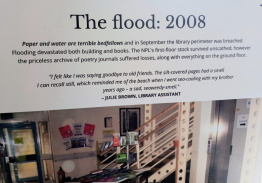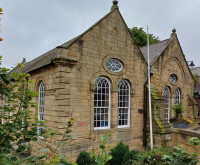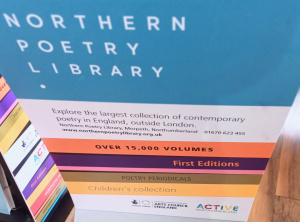Long after inundation, Morpeth's Northern Poetry Library still has big ambitions

The town of Morpeth in Northumberland is home to the Northern Poetry Library. Not a lot of people know that. Remarkably, according to its website, it has the largest collection of post-second world war poetry in England outside London. There are over 15,000 volumes, including first editions, signed copies and runs of poetry periodicals.
But … and it is quite a big But. Around half of its collection is currently stored at Northumberland county council’s HQ and unavailable to the public, owing to circumstances that date back to a catastrophic flood that hit much of Morpeth in 2008.
The Northern Poetry Library was set up more than 50 years ago, in 1968, and originally shared premises with Morpeth’s main library in Gas House Lane, beside the river Wansbeck.

Ironically the main library has just moved to sparkling new premises that it shares with Morpeth’s new leisure centre, in more or less its original location. The Northern Poetry Library meanwhile is situated nearby at the historic Chantry, a 13th century Grade 1 listed building, that it shares with a tourist information centre, a craft centre, and a bagpipe museum.

Years ago I spoke about the poetry library to a then-local poetry publisher, Sheila Wakefield of Red Squirrel Press, who lamented the fact that much of its stock was stored elsewhere for reasons of space, and was therefore inaccessible. A recent passing stranger, who said he was an English teacher, and who I encountered in Morpeth’s Tap and Spile pub before a meeting of Morpeth Poetry Group, expressed himself in somewhat stronger terms.
In the last few years the Manchester Poetry Library has opened, supported by Manchester Metropolitan University.
Nevertheless, given the recent years of library closures, maybe we should be grateful that the Northern Poetry Library is still there at all, in whatever form. Certainly some members of my U3A poetry group make regular use of its collection of anthologies when searching for poems on a particular topic.

Alison, who has previously worked for Kirklees Libraries in West Yorkshire, and has warm memories of working with Write Out Loud’s Julian Jordon in Marsden in the past, said the possibility of the Northern Public Library moving into Morpeth library’s new premises had not been ruled out, although the main library was still settling into its new home at the moment. She also hopes that the poetry library will return to staging events from time to time.
If you look at its website, for instance, it seems not much has happened in that regard since its 50th anniversary in 2018. Alison also wondered whether members of the local poetry community might volunteer to help the library raise its profile in the future. “I’ve been seeking ways and means of maintaining it. We would love to do more. It’s an ongoing discussion,” she said.
Morpeth has a lively poetry scene, with the well-established Morpeth Poetry Group that regularly stages its own events in the town, as well as its monthly open-mic nights, and the Northumberland Stanza group, aligned to the Poetry Society. So there may well be scope there for local poets to get more involved with the poetry library, in whatever way they can.
Maybe the remarkable thing about the Northern Poetry Library, in these years of austerity and library closures, is that it has survived at all. And that the powers-that-be are still determined to keep it open, and hopefully expand it in the future, no matter what.




